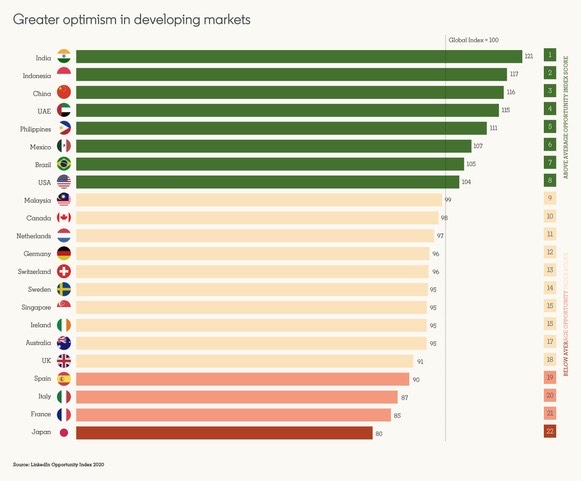When it comes to views on opportunity, Filipinos are the world’s fifth most optimistic, with many expressing confidence in “achieving success,” according to a recently published LinkedIn Opportunity Index by the social media network for professionals.
The index is “a composite measure that seeks to understand how people perceive opportunity and, more importantly, the gaps or barriers they believe are keeping them from reaching these opportunities.”
The index uses 100 as a baseline score for confidence; a higher score represents greater confidence from respondents living in a specific market. The Philippines’ is 111.
The other markets in the top five are India (121), Indonesia (117), China (116) and the United Arab Emirates (115). According to the report, globally, respondents from developing economies in Asia Pacific, Mexico, Brazil and the UAE are the most confident about accessing opportunities that they want. Such result is similar to the findings of the 2018 Index for Asia Pacific, wherein developing markets such as India, Indonesia and the Philippines scored higher than developed countries like Japan and Australia.
Over 30,000 respondents age 18 to 65 from 22 markets participated in the survey, which was commissioned by LinkedIn and conducted by independent market research firm GfK online between September and October 2019. It measured participants’ perception on socioeconomic and lifestyle factors, as well as opportunity, based on seven indicators: Outlook on economy over next 12 months, outlook on personal financial situation over next 12 months, quality of life (happiness), quality of life (compared to parents), availability of in-market opportunities, assessment on accessibility of opportunity, and confidence in achieving success.
According to LinkedIn, when it comes to their economic and financial outlook, 64 percent of Filipinos said that they believe they will be in better conditions in the coming year, while 73 percent said they see themselves in a better financial position in the same period. Two out of five Filipino respondents also expressed hope in establishing their own business, a sentiment that prominently stood out as well in Indonesia and Mexico.
But while Filipinos put a premium on career opportunities, the report says the ones that really matter to them are work-life balance, especially a job that offers that (43 percent); the chance to pursue their passions (42 percent); and spending quality time with loved ones (40 percent).
Hindering their pursuit of these—the major “opportunity gaps”—are lack of financial resources (37 percent), age (20 percent), and fear of failure (20 percent).
The challenge with age differs from each generation, says the report. Globally, 25 percent of Gen Z, or the 18- to 22-year-olds, struggle with insufficient work experience; 22 percent of millennials (23-38 years old), say their pain point is their lack of confidence.
Being able to secure a more stable job, or change to a new career path, on the other hand, are issues most relevant to Boomers (43 percent), followed by Gen X (27 percent).
“For the first time, four generations are working together. It’s time for businesses to set aside hiring biases against age, and embrace the multigenerational workforce as an opportunity,” says Olivier Legrand, managing director of LinkedIn in Asia Pacific. “The biggest skills gaps we see today are soft skills among Gen Zs and millennials, and tech skills among the older generations. We encourage companies to hire for complementary skills and to promote collaboration and bi-directional mentorship among their workforce.”
Despite the gaps, Filipino positivity is apparently hard to curb, with 75 percent of respondents saying they are confident about taking advantage of the opportunities available to them.
“Filipinos’ positive outlook on life and the economy is an affirmation of how resilient we are as a people. It is in our culture to consciously choose optimism to surpass adversities. One concrete example is how we view effects of disasters—we see it as a ‘period of resilience’ and less of a social accountability. The same mind-set is manifested in our views on looking for a job, on ensuring our financial stability, and even on our quality of education,” say Ireneo Jr. Demecais, YGOAL president and cofounder, and Asean Youth Community country director, in the report. INQ
View the full report here: https://economicgraph.linkedin.com/content/dam/me/business/en-us/talent-solutions/emerging-jobs-report/pdf/LinkedIn-Opportunity-Index-2020-Global-White-paper.pdf


